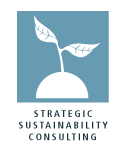 We're delighted to announce that DC Net Impact is co-sponsoring this event, and will be raffling off 8 spots for this workshop series.
We're delighted to announce that DC Net Impact is co-sponsoring this event, and will be raffling off 8 spots for this workshop series.
You care about the environment, social justice, and human rights. You recycle at home, make sure the lights are switched off at night, and take public transportation whenever possible. You avoid buying products from companies that contract from sweatshops, and even volunteer your time with a charity or two.
But what about at work?
You might not be in a position to dramatically change the direction of your organization, but you can have a positive influence on the environmental and social impact of day-to-day operations. That's where Strategic Sustainability Consulting can help. In this 4-week webinar series, you'll discover how to become a "sustainability champion" in your organization:
- Learn how to bring your personal values to the office in a positive, energizing way
- Convince your bosses that corporate social responsibility (CSR) is worthy of their time
- Determine the most important and strategic areas for an initial CSR program
- Implement a tracking program that truly measures progress towards sustainability
Each session is a 90-minute interactive workshop, where you'll gain a basic understanding of the topic, hear from an expert in the field, and have an opportunity to ask questions. These workshops are perfect for recent graduates and young professionals—those employees who have the passion, but not the decision-making authority, to tackle the challenges of organizational sustainability and corporate social responsibility.
Week 1 (March 6): Bringing Your Values to Work
Don't feel frustrated by the disparity between your personal values and your day-to-day workload! Very few of us actually have jobs where we're directly making the world a better place, but that doesn't mean you can't bring a spirit of positive social change to work with you each morning. We'll help you find a balance between your daily to-do list and the larger passions that motivate you to get up each morning.
Guest Speaker: Mary Guarino, Ph.D. is owner of StellarSelf, a personal coaching and wellness consulting practice focused on helping organizations that are dedicated to their employees’ well being, and helping individuals create more balanced, fulfilling lives.
Week 2 (March 13): Convincing Management That CSR Is Important
Unless you're in the top tier of management, it's unlikely that you can unilaterally introduce policies and programs to improve your organization's social and environmental impact. But by convincing your bosses that corporate social responsibility (CSR) is a good business investment, you can get the support you need to make some real changes. We'll show you how to make the business case for corporate social responsibility to your top management.
Week 3 (March 20): Building a CSR Program
Once you've gotten management buy-in, the next step is to start developing a corporate social responsibility (CSR) program. In this session, you'll learn how to conduct a "sustainability audit" to determine your organization's key social and environmental impacts, simple ways to start introducing CSR policies and programs, and low-cost strategies to energize your colleagues.
Week 4 (March 27): Tracking and Communicating Progress
A key part of any successful CSR program (no matter how small) is measuring and communicating your progress. Whether you're measuring pounds of recycled paper or hours of employee volunteerism, having hard data can make the difference between getting additional support (and recognition) and a sputtering enthusiasm. We'll show you how to set up your goals for maximum effect, what metrics to track, and easy ways to create internal and external CSR communications that inspire and energize stakeholders.
Date: Every Tuesday in March
Time: 12 p.m. – 1:30 p.m. EST
Location: CAAB Offices, 1801 K Street NW
Directions: 1 block from Farragut North—Red Line, 2 blocks from Farragut West—Orange/Blue Line
Cost: $250 (or $75 per individual session)*
Sign up at www.sustainabilityconsulting.com (click events)
* Ask your company if they will pay for these classes—it's part of your professional development, and by educating you on this important topic they will be helping themselves become more responsible corporate citizens!
** Also note: there is an online version of this event that happens the day after the in-person workshop. If you are able to attend some in person, but need to also attend some on the web, send us an email at info@sustainabilityconsulting.com and we can work out an arrangement.
.gif)